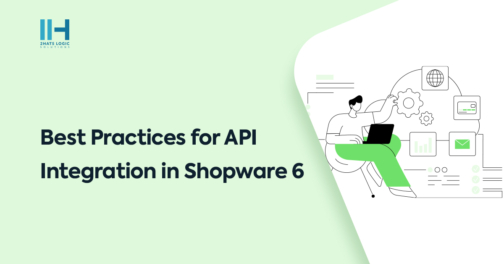Greetings! I'm Aneesh Sreedharan, CEO of 2Hats Logic Solutions. At 2Hats Logic Solutions, we are dedicated to providing technical expertise and resolving your concerns in the world of technology. Our blog page serves as a resource where we share insights and experiences, offering valuable perspectives on your queries.

The online store serves as the digital face of your ecommerce business. That online storefront should be able to adapt to the changing needs and offer a rich set of features. Shopware, renowned for its flexibility and scalability, stands out as a favoured platform for developers aiming to craft dynamic and efficient e-commerce solutions. When considering Shopware solutions, developers can leverage a variety of third-party APIs to enhance functionality and offer different shopping experiences.
Its popularity is attributed to its ability to meet the diverse needs of developers seeking to create engaging and scalable online stores. One key aspect that elevates the capabilities of a Shopware store is the integration of third-party APIs.
This blog post serves as a comprehensive guide for developers eager to harness the power of external APIs within the Shopware ecosystem. An expert Shopware developer can play a crucial role in implementing and optimising these integrations to meet the specific requirements of the online store.
Best 5 Practices for API Integration in Shopware 6
1. Configuration in Plugin
Ensure that API-related information such as API URL, username, password, client ID, and client secret is not hardcoded in the code. Instead, these should be stored in the plugin configuration. This allows for easy configuration changes without modifying the code.
2. Separate Authentication Function
Implement a separate authentication function for each API. This function should handle the authentication process required for every API call. A dedicated authentication function allows you to easily manage and update authentication logic without duplicating code across API calls.
3. Use Guzzle HTTP Package
Take advantage of the Guzzle HTTP package provided by Shopware 6 for making API calls. While Curl is an alternative, Guzzle simplifies the process and reduces the amount of code needed for API integration. This choice can enhance code readability and maintainability.
4. Postman Testing Before Implementation
Before integrating API calls into the Shopware 6 plugin, thoroughly test the API using tools like Postman. Ensure that the API calls are successful and that you understand the expected responses. This helps identify any issues with the API itself before incorporating it into the plugin code.
5. Exception Handling
Implement an exception-handling function to catch and manage exceptions that may occur during API calls. This function should be designed to capture errors in the API response and provide meaningful feedback to the Shopware plugin. Effective exception handling enhances the reliability and user experience of the integration.
Steps to Integrate API in Shopware 6
Understand the API Documentation
Obtain the API documentation for the service you want to integrate. This will provide details on endpoints, authentication methods, request and response formats, and any other relevant information.
Create a Plugin
Shopware 6 is built on Symfony, so you typically create a custom plugin to handle the API integration. You can use the Shopware CLI or manually create the plugin directory structure.
Configure Your Plugin
Set up the necessary configuration for your plugin, including any credentials or settings required for the API integration. This may involve creating a configuration file or using Shopware’s configuration system.
Implement API Requests
Write code to make API requests within your plugin. Use Symfony components or Guzzle, a popular PHP HTTP client, to send HTTP requests to the API endpoints. Make sure to handle authentication and error responses appropriately.
Handle Responses
Process the responses from the API. This includes parsing the data, handling errors, and updating your Shopware store accordingly. Map the API response to Shopware entities or data structures as needed.
Implement Event Subscribers and Services
Use Symfony’s event system to hook into relevant events in the Shopware application lifecycle. This allows you to trigger API requests at specific points, such as when an order is placed or a product is updated.
Test Your Integration
Test your integration thoroughly. Verify that API requests and responses are handled correctly. Pay attention to edge cases and error scenarios.
Handle Edge Cases
Consider scenarios such as rate limiting, network errors, and API changes. Implement appropriate error handling and logging to ensure your integration remains robust.
Document Your Plugin
Provide documentation for your plugin, including installation instructions and any configuration settings. This will be helpful for other developers or administrators who may work with your integration.
Conclusion
In conclusion, integrating third-party APIs into Shopware 6 can significantly enhance the functionality and user experience of your online store. By adhering to best practices such as storing API-related information in plugin configuration, employing separate authentication functions, utilizing the Guzzle HTTP package, conducting thorough testing with tools like Postman, and implementing exception handling, developers can ensure smooth and efficient API integrations.
As businesses expand and technology progresses, platform upgrades are essential. It’s wise to align API integration with the broader strategy, considering potential Shopware migration. Whether upgrading within Shopware or migrating from another platform, a well-executed migration plan ensures robust API connections. Engaging a specialised Shopware agency can further streamline the implementation and optimization of these integrations, ensuring a dynamic and successful e-commerce solution.
FAQ
What are the key benefits of integrating third-party APIs into a Shopware 6 store?
Integrating third-party APIs in Shopware 6 enhances the functionality and user experience of your online store. It allows developers to leverage external services, expand features and adapt to changing business needs dynamically.
Why is it important to store API-related information in the plugin configuration rather than hardcoding it in the code?
Storing API-related information in the plugin configuration provides flexibility for easy configuration changes without modifying the code. This practice enhances maintainability and allows for swift adjustments to API settings without the need for extensive code changes.
How does using the Guzzle HTTP package contribute to efficient API integration in Shopware 6?
Guzzle simplifies the process of making API calls in Shopware 6, reducing the amount of code needed for integration. This not only enhances code readability but also contributes to the maintainability of the integration, making it a preferred choice over alternatives like Curl
Why is it recommended to test API calls using tools like Postman before implementation in Shopware 6?
Thoroughly testing API calls using tools like Postman helps ensure that the calls are successful and that developers understand the expected responses. This practice identifies potential issues with the API itself before incorporating it into the plugin code, contributing to a smoother integration process.
How does effective exception handling contribute to the reliability of API integrations in Shopware 6?
Implementing an exception-handling function in Shopware 6 catches and manages exceptions that may occur during API calls. This enhances the reliability of the integration by providing meaningful feedback in case of errors, ultimately contributing to a better user experience and smoother operation of the online store.

Related Articles






